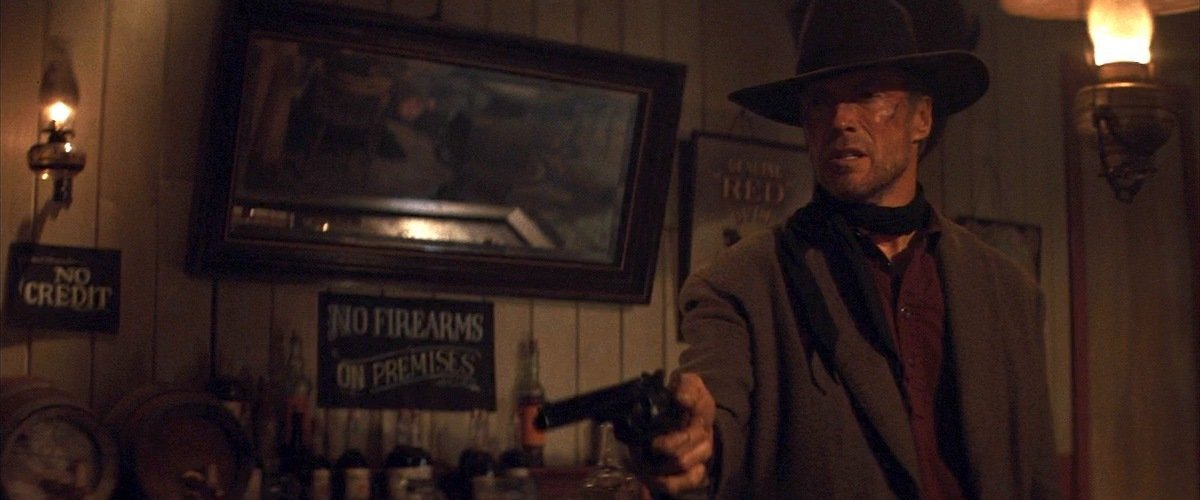
Directed by: Clint Eastwood
Starring: Clint Eastwood, Gene Hackman, Morgan Freeman, Richard Harris, Frances Fisher, Jaimz Woolvett, Saul Rubinek
Clint Eastwood's Oscar-winning Unforgiven is not a simple Western in which a gunfighter kills bad guys. There is a moral price to pay, either now or later, but the bill eventually comes due. By the time of Unforgiven's 1992 release, Eastwood was long established as a movie icon and director. Unforgiven made him an awards season favorite as well; with Eastwood walking away with Best Picture and Best Director Oscars for this film and twelve years later for Million Dollar Baby (2004). Both films are thoughtful takes on genres we assumed were milked for all they were worth, but Eastwood adds moral complexities to the mix.
Unforgiven opens in the 1880s Old West, with William Munny (Eastwood), a notorious former gunfighter and drunk, trying to eke out a living as a hog farmer. He was once a feared gunman with a wicked streak, but then retired after marrying and having two kids. The wife is now dead, but Munny tries to maintain his sobriety and keeps his guns gathering dust on the shelves. "He ain't like that no more," he tells people, but is that truly the case? A gun-toting bounty hunter dubbed "The Schofield Kid" (Woolvett), who hopes to kill off a group of men who abused a prostitute in the town of Big Whiskey, approaches Munny with an offer to join him in collecting the bounty. Munny reluctantly agrees, because he needs the money, and in some humorous scenes, we see how out of practice he is in even mounting a horse. But, we have the itching suspicion Munny will remember how to shoot when the chips are down.
As Munny is drawn back in to the life he had left behind a long time ago, he revisits old partner Ned Logan (Freeman) and persuades him to join the trek to Big Whiskey. Ned himself is now retired and battling daily with his own conscience over men he killed in the past. "We aren't like that no more, Will, we're farmers now," he tells Munny, but like Munny, farming isn't as lucrative as he would like. The three ride on to Big Whiskey, which is ruled with an iron fist by the sadistic sheriff Little Bill Daggett (Hackman-in his Oscar-winning Best Supporting Actor performance). Little Bill doesn't like the idea of bounty hunters coming to his town to stir up trouble and delivers a particularly savage beating to a bounty hunter named English Bob (Harris), who speaks of civility and culture in a world not quite ready for either.
We know what will happen as far as the plot goes, but what we aren't prepared for are the moral implications of killing someone. Did the men deserve justice for their acts of violence? Yes, but this brand? In which they are brutally shot and in some cases while defenseless? Unforgiven does not sidestep these questions. The characters answer them for us, especially in Munny's realistic speech to a shaken Schofield Kid: "It's a hell of thing killing a man. You take away all he has and all he is ever gonna have," Munny, Ned, and Schofield Kid all learn exactly where they stand when it is time to pull the trigger. Two are unable to do it, while one tucks away his conscience to finish the job they started.
There are moments of violence, but we aren't assaulted with them. Blood doesn't spurt out from heads blown to smithereens. Gunfights are savage enough and there are consequences to them. We see the myth of the Old West being shaped by a writer (Rubinek), who tags along with Little Bill to mythologize the West by writing books which glorify murderers as seekers of truth and justice. When Munny kills a roomful of men, he asks shamelessly, "Which one did you kill first?" Munny is having none of this, telling the writer, "I know who I am going to kill last," This may be the first time the writer ever truly gazed into the inferno.
Beautifully shot and crisply edited, Unforgiven does drag a bit in the early going and at times, the movie pounds its point home a little too often. In a way, though, Eastwood answers his earlier Western roles as "The Man with No Name" with a rebuke that is Unforgiven. He suggests even those characters had to be alone with their thoughts at some point and those thoughts may not have been pleasant. This isn't the first time Eastwood has done this. When Dirty Harry (1971) was criticized for being fascist in its approach to criminals, Eastwood starred again as Dirty Harry in Magnum Force (1973), in which he plainly rebuffs the notion his character is a mindless instrument of violence. Eastwood himself always instills his characters with an innate intelligence. He is incapable of playing dumb and is fully capable of reflection. He is quite a talent; efficient and minimalist both in front of the camera and behind it.
No comments:
Post a Comment